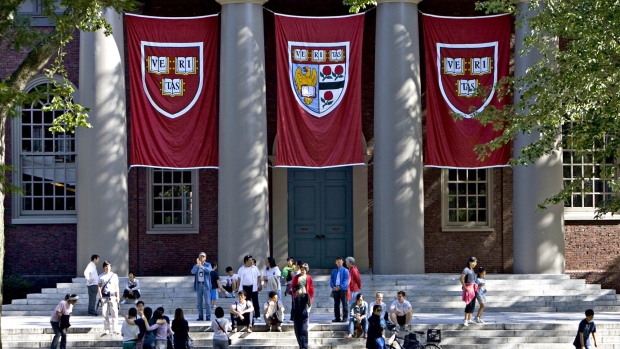Mar 11, 2020
Harvard to Prorate Undergrad Room and Board Costing $18,000
, Bloomberg News

(Bloomberg) -- Harvard College, where room and board for undergraduates costs almost $18,000 this academic year, plans to prorate such charges as of March 15.
The school informed students of the decision on a section of its website that addresses the impact of the coronavirus. Harvard has ordered students to move out of their housing by March 15. All courses will continue remotely.
As a growing list of colleges close dorms or move courses online, administrators are formulating plans on refunds. Yale, Cornell, Middlebury, and Grinnell colleges say they are looking into the issue.
Smith College in Massachusetts said it’s determining a process for prorated room and board. Amherst College said it will prorate fee payments for room and board for the time that students are away. “Since we do not yet know how long students will be away from campus, we do not know the amount of this reimbursement,” Kevin Weinman, chief financial and administrative officer at Amherst, said in a statement.
Harvard, the richest U.S. university, hasn’t yet determined other refunds. More than 55% of undergraduate students there receive financial aid and don’t pay the full amount.
“The university is still working on the details for what will happen with any other student charges,” Harvard College, the university’s undergraduate school, said in a statement on its website.Not every university has the resources to prorate student expenses.“The calculations that colleges have to do when determining refund policies are complex,” said Justin Draeger, president of the National Association of Student Financial Aid Administrators. “What some schools can afford to do will be very different from other schools.”
For schools that don’t offer online classes and have shut down, colleges would need to return students’ federal loans and government grants for those who are low-income, Draeger said.
Schools like Smith are making arrangements for those who cannot go home, such as international students and those who live in communities where the virus is widespread.
Colleges are also trying to address issues particular to low-income students. Harvard directed students who cannot afford transportation home to contact the financial aid office, which is working with students to offer financial assistance for travel costs. Smith said it is also “working through the impacts of those relying on work-study.”
School shutdowns disproportionally hurt students who have precarious financial situations, said Anthony Jack, an assistant professor at the Harvard Graduate School of Education.
“These closures are stress inducing beyond the worry about the pandemic coming to campus,” said Jack, author of “The Privileged Poor: How Elite Colleges Are Failing Disadvantaged Students.” “It’s the loss of security, the loss of stability in the place you have come to associate with meals, housing and access to resources.”
(Updates with Amherst refund information in fourth paragraph)
To contact the reporter on this story: Janet Lorin in New York at jlorin@bloomberg.net
To contact the editors responsible for this story: Sam Mamudi at smamudi@bloomberg.net, Alan Mirabella, Melissa Karsh
©2020 Bloomberg L.P.